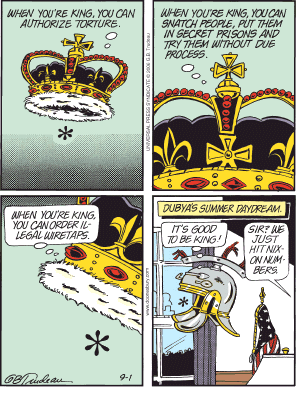I'm quite proud of my column that was in The George-Anne Thursday, so I'm putting it here as well. I received compliments. :)
And, to show that I'm doing this in the spirit of class, I'll add hyperlinks to it.
Freedom of speech should always trump controversy:
On Tuesday, Federal District Court Judge William Downes ruled that it was a First Amendment violation for the University of Wyoming to forbid Bill Ayers, co-founder of Weather Underground, a 1960s radical anti-war group, and current university professor, from speaking on campus.
The judge, who served as a Marine in Vietnam, issued his verdict – despite his contempt for Weather Underground – saying, “Mr. Ayers is a citizen of the United States who wishes to speak, and he need not offer any more justification than that.” He said that a free society must guarantee free speech rights, according to The Huffington Post.
Downes said the reasons the university provided were too vague to deny Ayers the right to speak – the university cited safety concerns as the reason.
Hm, that kind of sounds familiar.
Last March, Ayers was supposed to come speak at Georgia Southern, yet according to an article in the March 3, 2009 edition of The George-Anne, “[t]he event was cancelled last month following concerns from the university that included the security and expense that Ayers’ visit would have entailed.”
But Ayers came to GSU in November, at which time he said, “To say that the only reason I wasn’t invited was because of a safety concern is nonsense. I’m not afraid. I live openly at my house in Chicago.”
So, Ayers did not feel $13,000 in security was necessary, and the cancellation came after complaints from some of the GSU community and some of the Statesboro community. It becomes logical to assume, then, that despite said justification, it is more likely that the controversy created was more of an issue than anything else, and cancelling his visit was the response to succumbing to pressure.
That is a blatant violation of not only Ayers’ rights, but also a violation of the students’ rights who were deprived of an opportunity to hear him speak. A university should, more than almost any other institution, be a place where the free exchange of ideas, controversial or not, is encouraged.
If you don’t support/like Bill Ayers, fine. Don’t attend his presentation. Even protest it if you want, but respect the rights of others who want to hear him, and respect his right to speak. The First Amendment cannot be applied only when it’s convenient; it has to be applied across the board. This court case, one of many, has proven that just because the man is controversial does not mean that First Amendment rights both to freedom of speech and freedom of assembly can be violated.
If people are forbidden from speaking their mind or prevented from hearing opinions from all different sides, then there’s no way to grow. Just because you don’t agree with something doesn’t mean it can’t be said.
Therefore, I am of the opinion that Bill Ayers be invited back to GSU to speak in a venue that is not kept secret from the majority of the school. It is so important that students hear from many different kinds of people, so there’s no reason for the university to deny Ayers the opportunity.
And if there’s controversy again, at least there’s precedent favoring the First Amendment, what is supposed to be one of the core values of our nation.
Support can be shown by writing on the wall of the Facebook group “Sit-In for Academic Freedom at Georgia Southern University.”Oh, and on a side note, his speech took place at the University of Wyoming without incident.


























